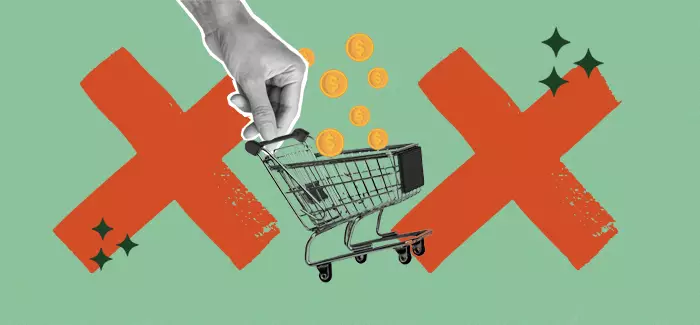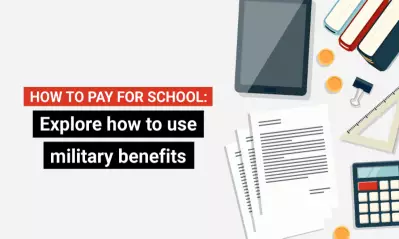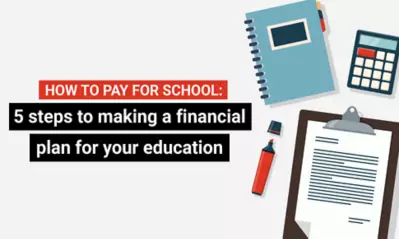Tips to stop overspending

Written by Michael Feder

Reviewed by¬ÝChris Conway,¬ÝDirector of Financial Education Initiatives and Repayment Management

Do you struggle with overspending? Between personal and educational expenses, it can be tough to save money and reach your financial goals. Learning and practicing smart financial habits can help you take better control of your money. Here are five practical strategies that may help you reduce excessive spending and improve financial stability.
Identify overspending triggers¬Ý
Overspending can be driven by both environmental and emotional triggers. While enticing store displays, sales emails, social media ads and even social pressure might tempt you to make certain purchases, stress and boredom can also lead to impulse purchases. Other factors may include emotional distress and even habitual spending.
No matter the cause, the effects can add up. A found that the average consumer spends $281.75 per month on impulse purchases.¬Ý
To combat this:
- Recognize emotional spending habits. Try alternative coping mechanisms if you typically shop to relieve stress. Things like journaling, exercising or engaging in your favorite hobby may help curb your urge to shop.
- Limit exposure. Avoid window shopping, use ad blockers and unsubscribe from email and text promotions. Become aware of the strategies used by retailers, which tend to create ads to promote online and in-store spending. Being conscious of these can help you avoid giving in to temptation.
- Establish a 24-hour rule. Wait a day before making a purchase to see whether you still need or want the item. The appeal of an unnecessary purchase can quickly evaporate after waiting a short period.¬Ý
Create a realistic budget¬Ý
It’s easy to underestimate your spending and lose control of your finances when you don’t have a clear budget. A well-organized budget can help you stay on track, avoid overspending and create better insight into how to manage your finances.
To gain financial clarity, track your spending each month and then cut back on unnecessary expenses. Ensure you’re consistently working toward your savings and financial goals by following these key budgeting principles:
- Distinguish between fixed and variable expenses. While variable costs, like groceries and entertainment can change over time, fixed costs (like rent, tuition, car insurance) typically don’t change (or at least not as often). If you are aware of these variations, you can adjust your spending accordingly.
- Cut costs and learn how to save money. For students, unexpected expenses like a medical bill or a sudden car repair can cause significant financial setbacks. Putting money away for emergencies and building a financial cushion helps you avoid relying on credit cards should those circumstances arise. Generally speaking, it’s a good idea to have at least three to six months’ worth of your expenses saved in an emergency fund. If this seems overwhelming, start small by setting a goal to save at least $500 to$1,000 and work your way up from there.
- Use budgeting tools like personalized spreadsheets and apps. Many can assist you in tracking your spending and identifying areas where you can save.
- Consider following the 50/30/20 rule. Allocate 50% of your income to needs, 30% to wants and 20% to savings or debt repayment. This can provide a clear and straightforward framework to follow, which can make it easier to track how you’re allocating your money and to see where changes can be made.
- Life circumstances can change, so review and monitor your budget at least once a month. Doing so can help you stick to your goals and recalibrate when necessary.¬Ý
Use smart shopping strategies¬Ý
Planning ahead and being mindful of your spending habits can potentially help you curb overspending. Whether shopping in-store or online, comparing prices before making a purchase can lead you to the best deals.
From there, consider using coupons and taking advantage of promotions to save on items you already planned to buy. Also, joining loyalty programs to earn rewards and coupons and to take advantage of discounts can be helpful.
The caveat? Avoid purchasing items you don’t need just because you have a coupon or find them on sale. Saving money is great but being mindful of how you shop also plays a crucial role in maximizing your savings.
As noted, money-saving apps can help you budget successfully. Some apps can help you keep track of and cancel unused subscriptions, for example, while other platforms offer price tracking, cashback benefits and assistance with finding the best bargains on your purchases.
Finally, try not to treat shopping as a social activity or something you do to boost your mood. It‚Äôs wise to shop only when you need or want a specific item, and avoid aimless browsing, which can lead to overspending if you struggle with self-control.¬Ý
Delay gratification
Cultivating patience when making spending decisions can also help reduce overspending. Ask yourself, “Does this purchase align with my goals? Can I afford this right now? Is there a more cost-effective alternative?” If a purchase would make it difficult to pay off a debt or save for a big item, it’s best to reconsider.
You should always prioritize essential expenses over short-term wants. Impulse spending may result in short-term satisfaction but may enhance long-term financial stress. It may be best to hold off on a purchase if you cannot afford the item without going into debt.
Utilizing credit cards and carrying balances month after month increases your total cost due to interest. It can also negatively affect your credit score if it reflects frequent spending, high balances and sporadic on-time payments. Your credit scores can then affect your ability to obtain loans, rent an apartment or even get lower interest rates on future purchases.
For students with higher credit scores, it may be easier to qualify for off-campus housing or financing for a car. Your scores can be a critical component of your overall financial health, and it’s important to understand how managing debt affects them.
Ultimately, taking time to reflect on purchases can help prevent buyer‚Äôs remorse and encourage mindful spending. But if you still want to indulge now and then, consider creating a ‚Äúsplurge fund,‚Äù which allows for discretionary spending while keeping you within your budget.¬Ý
Build an emergency fund¬Ý
Life can be unpredictable, so having a solid safety net is generally a good idea. Many people turn to credit cards or loans when they don’t have savings, and that can result in long-term debt.
A solid emergency fund can start with these steps:
- Start small and be consistent: Over time, even small, consistent deposits add up. This can potentially provide peace of mind.
- Automate your saving: Set up automatic transfers to a savings account. Making it automatic can not only ensure regularity but also spare you the temptation to spend what you should be saving.
- Use an app or your bank’s round-up savings program. This feature allows you to automatically round up your debit card purchases to the nearest dollar amount or an amount of your choice, which can expedite your savings goals.
- Avoid using your emergency fund for non-emergencies. In doing so, your money will be available when you need it most.¬Ý
Learn more about how to avoid overspending
Whether you‚Äôre looking to curb overspending or simply develop better financial skills, ∆þ…´ ”∆µ offers resources to help! Check out the webinar on money-management tips presented by UOPX and Goalsetter. Or, visit the University's¬ÝFinancial Literacy and Wellness Center¬Ýfor practical insights.

ABOUT THE AUTHOR
A graduate of Johns Hopkins University and its Writing Seminars program and winner of the Stephen A. Dixon Literary Prize, Michael Feder brings an eye for detail and a passion for research to every article he writes. His academic and professional background includes experience in marketing, content development, script writing and SEO. Today, he works as a multimedia specialist at ∆þ…´ ”∆µ where he covers a variety of topics ranging from healthcare to IT.

ABOUT THE REVIEWER
As Director of Financial Education Initiatives and Repayment Management,¬ÝChris Conway works with departments across the University to provide resources that allow students to make more informed financial decisions. She is also an adjunct faculty member for the Everyday Finance and Economics course at the University, and she chairs the National Council of Higher Education Resources College Access and Success Committee. Conway is committed to helping college students make the right financial decisions that prevent future collection activity.
This article has been vetted by ∆þ…´ ”∆µ's editorial advisory committee.¬Ý
Read more about our editorial process.
Read more articles like this:


